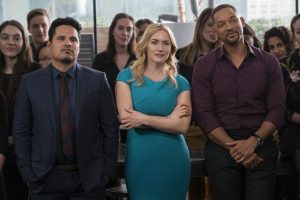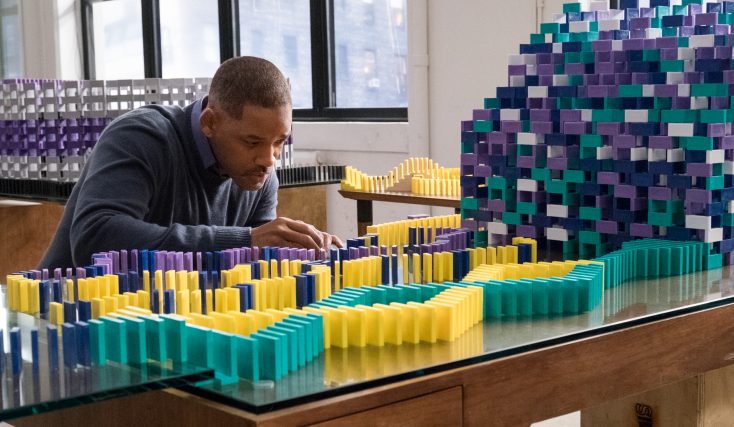
(l-r) Michael Pena, Kate Winslet and Will Smith star in COLLATERAL BEAUTY. ©Warner Bros. Entertainment. cR: Barry Wetcher.
By ANGELA DAWSON
Front Row Features
HOLLYWOOD—Will Smith is best known for his music (as the Fresh Prince) as well as his comedy and action hero roles. But the world-renowned performer has demonstrated on several occasions that he is also adept at delivering powerful performances in dramatic roles in films including “Six Degrees of Separation,” “Ali,” “The Pursuit of Happyness” and “Concussion,” to name a few.
The versatile actor now plays Howard, a grieving father who has to find a way to reconnect with the world after his devastating loss in David Frankel’s star-studded “Collateral Beauty.” (The tearjerker stars a who’s who of Academy Award winners and nominees including Helen Mirren, Keira Knightley, Kate Winslet and Edward Norton.) Howard tries to cope with his loss by writing letters—not to people, but to things—Love, Time and Death. And then, unexpectedly, he gets responses, which makes him see the world in a new light. The two-time Academy Award nominee (“The Pursuit of Happyness,” “Ali”) recently spoke about portraying a despondent man while coping with a real-life personal loss.
Q: What drew you to playing Howard?
Smith: When I first read the screenplay it spoke to that Christmas flavor that I remember growing up; “It’s a Wonderful Life” those types of films that are right on the edge of fantasy with that Christmas magic to it. They’re right on the edge but dealing with things that are deeply and powerfully real and human. There was the timing in my life also with this film—the pursuit of the ideas. I loved that this was a guy who had the world on a string. Everything was perfect. He had it. He had life figured out then suffered a loss and had to make his way back to even believing there was a possibility to have joy again so I really loved that journey. It was really close to me. Howard thinks about life a lot of the ways I think about life and he had to move from thinking he could solve all the issues of life with his mind to accepting that there is a certain amount of bleeding that you have to do to be able to purge and cleanse yourself to be able to experience joy. The pain and joy and growth are all inexorably bound together.
Q: Has the film changed the way you cope with loss?
Smith: My experience during the time of working on the film, my father was diagnosed with cancer and he was given six weeks during the process so it was a truly beautiful time for he and I because I was in Howard’s mind studying and reading all of the different religious basis for being able to find an answer as to how we recover from this kind of loss and I was sharing that with my father through the experience—everything from the “Tibetan Book of the Dead” to Elizabeth Kubler Ross. I read everything that you could possibly (check out) to deal with the inevitable pain of death and I was able to do that as Howard but also be able to share and work on that with my father. So the idea of that loss and that type of pain, this movie and these ideas have changed me forever. So, it’s the ultimate human difficulty. How do you deal with death and loss? It was the perfect life/art confluence and, for me, I hope people can feel the depth and power of what’s going on in the film.
For example, in my mind I decided that Howard had moved to Buddhism. When the movie starts he’s trying Buddhism. There is a shot that goes across the teaching of Buddha when he is writing the letters and there is a thing the Buddhist monks do, the mandalas for twelve or fourteen hours a sad they make these beautiful sand mandalas and they work and slave all day and they stand up, look at it for sixty seconds and wipe it away, this beautiful piece of art and they just destroy it for the practice of impermanence. That was the idea I was working on with the dominoes. He has these domino mazes and tips them and turns and doesn’t even watch it fall as the practice of impermanence and letting things go so I am forever changed from working on “Collateral Beauty.”
Q: Which of the elements—Time, Love or Death—would be the most difficult or most painful to deal with?
Smith: Nothing tortures me more than love. There is nothing in life that I experience more pain around than love. Even in dealing with my father’s passing, what comes back to me and how I react to that is “Jada (Pinkett Smith), you’re not loving me enough!” It’s like, “Listen, if we are going to die, we need to spend more time together.” It’s the craving for love for me is far beyond the loss of death and beyond the punishment of time.
Q: You’ve done some bad boy roles. Are you transitioning to more emotional roles now?
Smith: I’m having more life experiences. They enable me to connect to different, more complex, deeper human emotions. As an artist, I am my tool and my life experience is my well so as I have more life experiences. My daughter (Willow) just turned 16 so I watched my 16-year-old daughter drive away from the house with her driver’s license so that’s like, “My youngest child is 16!” so now I’m open to be able to deliver unique and different-textured performances of a father with a 16-year-old daughter so as I’m growing older, I’ve been in the spotlight for 30 years. I released my first record in 1986 and I was a kid so the things I was doing then had a beautiful, youthful exuberance to them and I try to maintain some piece of that but who I am and how I live on a daily basis is more complex than the Fresh Prince so I’m just I’m trying to be brave enough to not cling backwards and to go bravely into the unknown potentially of unaccepted. So, I want to be able to courageously go forward to find those new things and deliver those new ideas.
Q: When will you return to music and what is your favorite holiday song?
Smith: I always record. I probably have 60 records that I recorded but it’s about finding that thing that really feels like it’s going to deliver the truth of what I want to say so I just haven’t hit that record. I’ve been in the studio with everybody. I’m just looking for finding that way back in. My favorite holiday song? What’s that record with Ella Fitzgerald and Louie Armstrong? (He sings) “I really can’t stay. Baby it’s cold outside.” I love that record. I’ve been begging Jada for years “Baby, that has to be our Christmas card. We’ll just lip-sync that record.” That one really sets me into the Christmas spirit.
Q: Howard faces tragedy but his life changes after meeting three people. Can you think of any life-changing moment in your life?
Smith: I’ve had huge life-changing moments, again, all centered on love. I’m a serious hopeless romantic. I think the greatest experience of love I’ve ever had was when my daughter was born. I remember when Willow was born I sat down with Jada and just looking at the two of them I was just full as I ever have been. That was the maximum amount of love I’ve ever experiences in my life. It was the safest and purest and happiest that I’ve ever been in my life and I think, subconsciously, I chase that (feeling) every day of my life.
Q: What is the collateral beauty that Howard finally finds?
Smith: Howard was trying to solve his problems with his mind. He thought he could think his way through this problem and what he realized is that he had to bleed, suffer and mourn. He had to let it go and when he finally had the opportunity to just release and let it all go, the collateral beauty was the joy that he was ultimately seeking in the first place. It was this opportunity to be with this woman in a more profound, more authentic way than he had ever dreamed possible. A big part of being able to love and have the experience of the Holy Ghost in your love is surviving with someone. I think it’s the Marines that say, “Everybody wants to go to heaven but nobody wants to die.” There’s a certain amount of suffering you have to go through with a person to experience the kind of love that we all crave. That was the thing for Howard, realizing that feeling that he wanted to have with this woman was on the other side of fully experiencing the pain and the loss. The collateral beauty was on the other side of what he was trying so desperately to avoid.
There is a wonderful quote from Khalil Gibran that I love that says, “Pain is the knife that hollows us out so that we can hold more joy.” I thought that’s such an interesting idea that you suffer that pain and you are torn open for the purpose of being able to hold more light and joy and positivity. I think that is the collateral beauty of the type of suffering that Howard experienced in this film.




